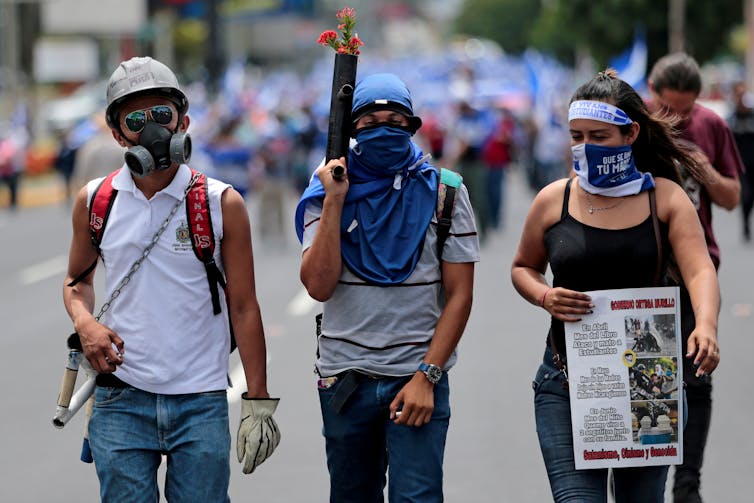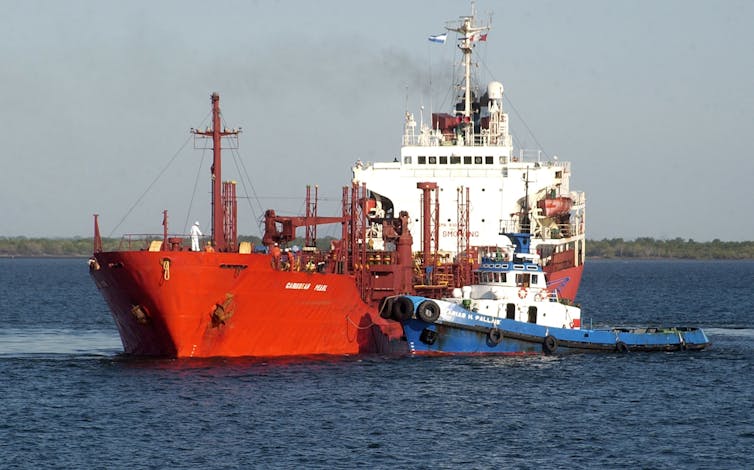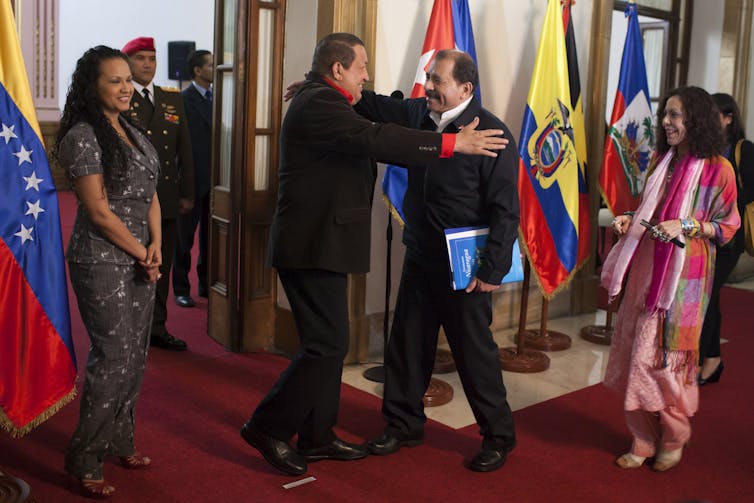Venezuelan oil fueled the rise and fall of Nicaragua's Ortega regime
- Written by Benjamin Waddell, Associate Professor of Sociology, Fort Lewis College
The downfall of Nicaragua’s President Daniel Ortega has been dizzyingly fast[1].
In January 2018, he had the highest approval rating of any Central American president[2], at 54 percent[3]. Today, Nicaraguans are calling for Ortega’s resignation[4].
Ortega, a former Sandinista rebel who previously ruled Nicaragua in the 1980s, first showed signs of weakness in early April, when students protested his mismanagement of a massive forest fire[5] in Nicaragua’s biggest nature reserve.
By April 19, hundreds of thousands of Nicaraguans, including former Ortega supporters[6], joined the demonstrations, after his government rammed through an unpopular social security reform.
Since then, police officers and pro-government forces[7] have killed more than 450 protesters and injured at least 2,500.
 Demonstrators have been calling for Ortega’s resignation since April.
Reuters/Oswaldo Rivas[8]
Demonstrators have been calling for Ortega’s resignation since April.
Reuters/Oswaldo Rivas[8]
In an echo of Nicaragua’s past, foreign money has contributed to the country’s current unrest. In the 1970s, the U.S. supported the regime of Gen. Anastasio Somoza[9] – a brutal dictator who was eventually overthrown by Ortega and his revolutionary peers in 1979’s Sandinista Revolution[10].
This time, it’s not the U.S. that’s supporting an unpopular Nicaraguan dictator, it’s Venezuela.
Oil diplomacy from Venezuela
I am a former Nicaraguan resident, who was recently forced out of the country by violence. I am also a scholar[11] of Latin America’s political economy. And my research in Nicaragua suggests that Venezuelan oil money helps explain Ortega’s rise – and his current fall.
Ortega was re-elected to the presidency in 2007[12] after two decades out of power. At the time, he was one of many left-leaning leaders[13] in the region.
Venezuela, then led by the socialist leader Hugo Chávez, immediately began sending billions of dollars worth of cheap oil[14] – its biggest export and most valuable commodity – to Nicaragua. According to Nicaraguan economist Adolfo Acevedo[15], between 2007 and 2016, Venezuela shipped US$3.7 billion in oil to Nicaragua.
 From 2007 to 2016, Venezuela sent Nicaragua shipments of cut-rate fuel as a demonstration of its support for Ortega’s regime.
Reuters/Jorge Cabrera[16]
From 2007 to 2016, Venezuela sent Nicaragua shipments of cut-rate fuel as a demonstration of its support for Ortega’s regime.
Reuters/Jorge Cabrera[16]
“Oil diplomacy” was standard practice in Venezuela at the time. In the early 2000s, Venezuela was one of Latin America’s richest countries[17]. Chávez used his economic brawn to support allies in Cuba, Argentina, Ecuador and Brazil by sending them financial aid and cheap crude[18].
Venezuela offered the Ortega regime unusually favorable terms of trade. His government paid 50 percent of the cost of each shipment within 90 days of receipt. The remainder was due within 23 years and financed at 2 percent interest.
This cheap fuel was distributed at market prices by Nicaragua’s government gas company, DNP. The government’s nice profit margin helped spur a period of remarkable economic growth in Nicaragua[19].
Between 2007 and 2016, Ortega’s government spent nearly 40 percent of oil proceeds to bolster ambitious social welfare programs[20], including micro-financing for small businesses, food for the hungry and subsidized housing for the poor.
These initiatives contributed to significant poverty reductions across Nicaragua[21], earning Ortega and his Sandinista party[22] widespread popular support.
Between 2007 and 2017, Nicaragua’s gross domestic product grew at an average of 4.1 percent a year[23]. The boom peaked in 2012, with a stunning 6.4 percent growth in GDP.
The year before, Venezuela had sent a record $557 million in oil to Nicaragua – the equivalent of 6 percent of the Central American country’s total gross domestic product[24].
Ortega’s oil wealth
Beyond jump-starting the Nicaraguan economy, Venezuelan oil also directly benefited the Ortega family.
DNP, Nicaragua’s national oil distributor, is managed by Ortega’s daughter-in-law, Yadira Leets Marín[25].
According to investigative reporting by the Nicaraguan newspaper Confidencial[26], the 60 percent of earnings from Venezuelan oil sales not spent on social programs – roughly $2.4 billion – was channeled through a Venezuelan-Nicaraguan private joint venture called Albanisa[27], run by President Ortega’s son, Rafael Ortega.
The funds were invested in shadowy private businesses controlled by the Ortega family, including a wind energy project, an oil refinery, an airline, a cellphone company, a hotel, gas stations, luxury condominiums and a fish farm.
There is no public accounting of Albanisa’s investments or profits. But according to Albanisa’s former deputy manager, Rodrigo Obragon, who spoke with Univision in May[28], President “Ortega used Albanisa to buy everybody off in a way never seen before in the history of Nicaragua.”
Ortega’s personal wealth is unconfirmed. But reliable sources, including the Wall Street Journal[29], say that his family has amassed one of the largest fortunes in the country[30].
 Chávez greets Ortega during a welcoming ceremony in Caracas.
Reuters/Carlos Garcia Rawlins[31]
Chávez greets Ortega during a welcoming ceremony in Caracas.
Reuters/Carlos Garcia Rawlins[31]
An uphill battle
Ortega’s landmark social programs, coupled with the lucrative business ventures that allowed him to buy support, made him the most powerful Nicaraguan leader since Somoza.
During his 11 years in office, Ortega has abolished presidential term limits[32], installed his wife as vice president[33] and banned opposition parties from running in elections[34].
In late 2015, plummeting global oil prices sent Venezuela’s mismanaged economy into recession, and then into a full-on collapse[35].
Chávez’s successor, President Nicolás Maduro, was forced to cut back on oil diplomacy. As a result, in 2017 and 2018 his government sent no oil shipments at all to Nicaragua.
In effect, Ortega had to cut his landmark anti-poverty programs[36], eliminate subsidies on public utilities[37] and raise gas prices at the pump[38].
Support for his regime eroded quickly[39] after that.
Like the dictator he helped oust three decades ago, Ortega has relied on foreign money to buy his way through challenges. Now that Venezuelan money has dried up, he’s got little left to offer his people – one more reason, protesters say, Ortega’s time is up.
References
- ^ dizzyingly fast (nacla.org)
- ^ highest approval rating of any Central American president (www.hispantv.com)
- ^ 54 percent (www.tn8.tv)
- ^ Ortega’s resignation (www.elmundo.es)
- ^ massive forest fire (www.theguardian.com)
- ^ former Ortega supporters (www.latercera.com)
- ^ police officers and pro-government forces (www.oas.org)
- ^ Reuters/Oswaldo Rivas (pictures.reuters.com)
- ^ Gen. Anastasio Somoza (www.theguardian.com)
- ^ Ortega and his revolutionary peers in 1979’s Sandinista Revolution (web.stanford.edu)
- ^ scholar (www.researchgate.net)
- ^ was re-elected to the presidency in 2007 (www.theguardian.com)
- ^ many left-leaning leaders (mondediplo.com)
- ^ sending billions of dollars worth of cheap oil (confidencial.atavist.com)
- ^ Nicaraguan economist Adolfo Acevedo (theglobalamericans.org)
- ^ Reuters/Jorge Cabrera (pictures.reuters.com)
- ^ richest countries (data.worldbank.org)
- ^ financial aid and cheap crude (www.libertaddigital.com)
- ^ remarkable economic growth in Nicaragua (www.bancomundial.org)
- ^ ambitious social welfare programs (nacla.org)
- ^ significant poverty reductions across Nicaragua (www.telesurtv.net)
- ^ Ortega and his Sandinista party (confidencial.com.ni)
- ^ grew at an average of 4.1 percent a year (datos.bancomundial.org)
- ^ total gross domestic product (datos.bancomundial.org)
- ^ Yadira Leets Marín (www.laprensa.com.ni)
- ^ reporting by the Nicaraguan newspaper Confidencial (confidencial.com.ni)
- ^ Albanisa (www.univision.com)
- ^ spoke with Univision in May (www.univision.com)
- ^ Wall Street Journal (www.wsj.com)
- ^ largest fortunes in the country (www.csmonitor.com)
- ^ Reuters/Carlos Garcia Rawlins (pictures.reuters.com)
- ^ abolished presidential term limits (www.aljazeera.com)
- ^ wife as vice president (www.nytimes.com)
- ^ banned opposition parties from running in elections (www.economist.com)
- ^ into a full-on collapse (theconversation.com)
- ^ cut his landmark anti-poverty programs (confidencial.com.ni)
- ^ eliminate subsidies on public utilities (www.laprensa.com.ni)
- ^ prices at the pump (www.laprensa.com.ni)
- ^ eroded quickly (www.elnuevodiario.com.ni)
Authors: Benjamin Waddell, Associate Professor of Sociology, Fort Lewis College

